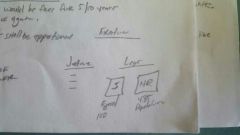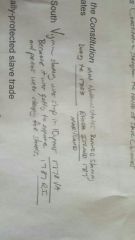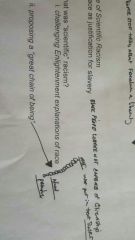![]()
![]()
![]()
Use LEFT and RIGHT arrow keys to navigate between flashcards;
Use UP and DOWN arrow keys to flip the card;
H to show hint;
A reads text to speech;
57 Cards in this Set
- Front
- Back
- 3rd side (hint)
|
As the forces of slavery grew in the late 18c and early 19c, free blacks did what they did to strengthen their communities |
Slavery |
|
|
|
Northern contraction; Southern expansion (A.) Emancipation in the North |
Northern states slavery is shuting down South slavery was still strong and expanding |
|
|
|
Emancipation in the North |
Political force Economics Force of Idea |
|
|
|
Black Patriots |
African American change sides 13 colonies become 13 states Patriots = support War/ Patriots forbid black Enlistment |
|
|
|
Black Patriots |
African Americans join the side that gave them freedom The North= Patriots |
|
|
|
North |
Patriots=America |
|
|
|
South |
Loyalist=Stay with the king and against the war |
|
|
|
Dunmore's Proclamation |
10,000 black American slaves left with British |
|
|
|
Free black community's |
The creation of free black communities during the nation's early decades laid the foundation for the urban experience of future African Americans |
|
|
|
Emancipation |
Political force, constitutional, economics. Vermont first city to abolish slavery in 1777 Did it with state constitution |
|
|
|
Northwest Ordinance of 1787 |
4 years after the war ends for Second Continental Congress passed the Northwest Ordinance to provide the political organization of the vast region beyond the Appalachian Mountains |
|
|
|
Northwest Ordinance of 1787 |
Anthony Benezet and the world's first antislavery society
Aims of Quakers dominated abolition Society
Sad process word treaties become state, it also banned slavery |
|
|
|
Anthony Benezet |
1775 First antislavery society ever Quaker founder in Pennsylvania
Believe that free blacks could be sent back to Africa
Believe in the logic of gradualism (gradual conversate emancipation in steps Free slaves
But money will go to the slave master like a text credit |
|
|
|
Antislavery society |
Antislavery in the Upper south= (small and short lived) Never an antislavery society in the deep south Quakers believed it was wrong to enslave someone |
|
|
|
Manumission and Self-Purchase |
Post Revolutionary manumisson laws in south ( before you have to go to court to free a Slave/ after now you could privately if you wanted to) |
|
|
|
Manumisson and Self-Purchase |
Not Statewide/ these are private Makes motivations for manumission (Sometimes people did it for the right reasons/ sometimes it was for profit/ sometimes just because) |
|
|
|
Self-Purchase (buying yourself) |
Freedom/ is always a struggle always a fight you really never get FREEDOM |
|
|
|
Slave trade clause |
Arguments for constitutionally- protected slave trade Article1 S9 = allowed slave trade to go on for 20 years What it did= 1787 to 1808 more slaves introduced United States in this time. Cotton made South carolina-georgia come out on top because of this |
|
|
|
The Fugitive Slave clause |
Article IV S3= allowed Masters to go after slaves across state lines What it did= extended the powers of the slave masters deep in the south. A lot of mistaken identities happen around this time/ also slaves would be free for 5 to 10 years and get caught and enslaved again |
|
|
|
The Three-Fifths clause |
Article 1 S3= representatives and direct taxes shall be appointed What it did= gave Southern States more political power Southern States wanted to count for Representatives but not for taxes 1. Free persons 2. Person bound to services 3. Untaxed indians 4. 3/5 of blacks = to pay less taxes |

|
|
|
U.S. Constitution |
Pro-slavery Clauses in the US Constitution/ was in favor of Slavery to be continued. Constitutional ratification and Southern slaveholders ( 1787 approved and gave in to the demands of key states in the south 3 BAD PARTS IN THE CONSTITUTION |
|
|
|
U.S. Constitution |
The Constitution strengthen the hand of the slave owners State of the slave trade before The Constitution 1. Banned in the northern states ( most northern states banned slavery during the 1700s) 2. Banned, too, in Upper south ( Virginia slavery was stopped in 10 years because it was getting too expensive and prices for we're dropping for slaves |

|
|
|
The cotton gin |
In 1793 Eli Whitney invented the cotton gin |
|
|
|
The cotton gin |
England was industrializing and having textile mills Britain look to the American South for a cotton Because of the cotton gin slavery came back and was the United States biggest export Use for men clothing Army in 1810 cotton was the most profitable export |
|
|
|
"KING COTTON" |
U.s. contradiction increases before 1790 cotton was not important yet Exports create north-south pro-slavery Alliance 1. Cotton our must lucrative export 2. "Lords of the Lash" Join "Lords of the Loom" ( Bond for Money) |
|
|
|
"KING COTTON" |
Reinvigorating the slave-system Cotton spreads into new slave states and states make a lot of money because of cotton 22% American North 4% American South Rise of the internal slave trade( cotton was the reason/ new slave states opening up because of it/ the trafficking started around this time (kid nap) from northern states to the slave states Chesapeake |
|
|
|
Scientific racism Ideas Factor |
Retreating from Revolutionary egalitarianism 1776--------1793 Cotton gin Revolutionary war 1776 people forget Us reacts to "excessive liberty" of French Revolution Cotton and slave price go up/ criticism of slavery go down People stop talking about freedom and liberty |
|
|
|
"Scientific Racism" |
Racist justification for slavery ( black people were not capable of citizenship) What is "Scientific Racism"? Challenging in lightening explanations of race Proposing a great chain of being |

|
|
|
"Scientific Racism" |
Thomas Jefferson was a prominent example of scientific racism The impact of scientific racism/ slavery was growing very large/ black Americans had no place in the United States= White male citizens 1790 1792 |
|
|
|
Mutual Aid societies |
Earliest first black Institution Providing financial services and support Society for free black women Newport Rhode Island 1780 |
|
|
|
Mutual Aid societies |
By 1830 hundred black Mutual Aid Society More common in the north than the South |
|
|
|
Mutual aid societies |
"Black Freemasons" United black men from different cities Prince Hall and the Prince Hall Masons Prince Hall the most famous black nation |
|
|
|
Blacks in the Continental Army |
Most Patriot leaders refused to permit African-Americans were the slave or free to fight in the American side at all. By the late 1775 and early 1776 the Continental Army and most State militias have been free blacks and slaves from military service. |
|
|
|
Blacks in the Continental Army |
My 1777 concerned about worsening Manpower shortage the states begin to accept free black men into militia units |
|
|
|
Black Loyalists |
The British office slaves their best chance at Liberty |
|
|
|
Economics changes in N. |
Northern states start to move in a different direction than the south Lightning ideas about natural rights started to come about northern states stars to pass laws that outlawed slavery |
|
|
|
Elizabeth Freeman |
Set in motion a chain of events in the judicial decision that ended slavery in her state Freeman test a lawyer to test whether the language of Massachusetts new state constitution with this statement all men are born free and equal apply to her |
|
|
|
Elizabeth Freeman |
The Freeman decision said of president in the similar case two years later runaway slave sued for his freedom, the state supreme court upheld the County court jury decision striking down a hundred and fifty years of slavery Massachusetts |
|
|
|
Quok Walker |
Left his master just walked away and it ended upnin court and ordered that he was freed by the Court |
|
|
|
Gradual emancipation schemes |
That slave master would let there slaves go if that received a payment for it. And incentive |
|
|
|
Prince Hall Masons |
*Most famous black Mason*
1791 he became grand master
African grand lodge of North America
The Orginal masons rejected his membership because he was black
Gave men a way to bond/ ritural |
|
|
|
Richard Allen |
Had the first black church inside a white church called St. George Methodist in Philadelphia (AME) African Methodist Episcopal Church Black church and black denomination 1816 small/ true independent Bethal church |
|
|
|
Absalom Jones |
Could not pray inside white part of church Jones black church in white denomination Jones/St. Thomas |
|
|
|
AME Church |
Church from, Maryland Delaware New Jersey and Pennsylvania resolved to become one body inder the name (African Methodist Episcopal Church) Became the largest domination of black Christians in United States Allen was the first Bishop |
|
|
|
Black schools |
The first black schools 1700's Maybe White-run schools By white Preachers/ Boston/Massachusetts |
|
|
|
Black schools |
Created after Revolution Reasons for starting ( Black mutal aidsociety) Students could not get into schools 1818 Mother Methal first black church/ with all black instructors |
|
|
|
Colonization (Black advocates for colonization) |
Prince Hall 1787 Africa Daniel Coker (first to leave United States with 80 people ti Liba) Paul Cuffe ( Sea Captain/ Anti Slave advocate |
|
|
|
Slave Rebellions |
Lowered expections/ and serve their masters Others risked thier lives/ to due away with slavery Southern States concplated hard choices |
|
|
|
Hezekiah Grice |
Organize forst black congregation 1830 In Richard allen church It became an annually event to go on for year/ all across the north/ not really in the South Black lead woth ideas |
|
|
|
Black convention movement 1830-64 |
One Manifest Destiny of the Civil War Host of issue would be discussed/address Gave black speakers an important patlform to talk and give ideas Also provide a setting for Abolitionists |
|
|
|
Immediate emancipation |
(AASS) Anti-Slavery Society William Lloyd Garrison called for after 1831 immediate emancipation |
|
|
|
The Liberator |
1831 Newspaper founder William Garrison Paper spoke about black issues and blacks supported the paper Garrison was concerned with black issues/ but didn't have many blacks at the top working for him |
|
|
|
(AASS) |
Anti-Slavery Society founder Garrison |
|
|
|
Trail of Tears |
Racist ideas gave birth to Violence "The Trail of Tears" Indians Cherokee died on the way to new land 4,000 Indians died |
|
|
|
Manifest Destiny |
It was the conviction that superior culture and institutions gave Americans a God-given right and obligation to spread thie civilization across the continent |
|
|
|
Slave Rebellions |
A. Southern slaves confront hard choices B. Loyalty, Resistance, Escape, and Violent Uprising C. What inspired slave uprising in post-revolutionary US? American and French Revolutionary ideas Toussaint L'Ouverture |
|
|
|
Slave Rebellions |
Garbriels Rebellions (Norfolk, VA, 1800) People where beaten/ had poor people rallying to his cause. August 30th 1800 two slaves told about the plan/ storm also happened |
|

